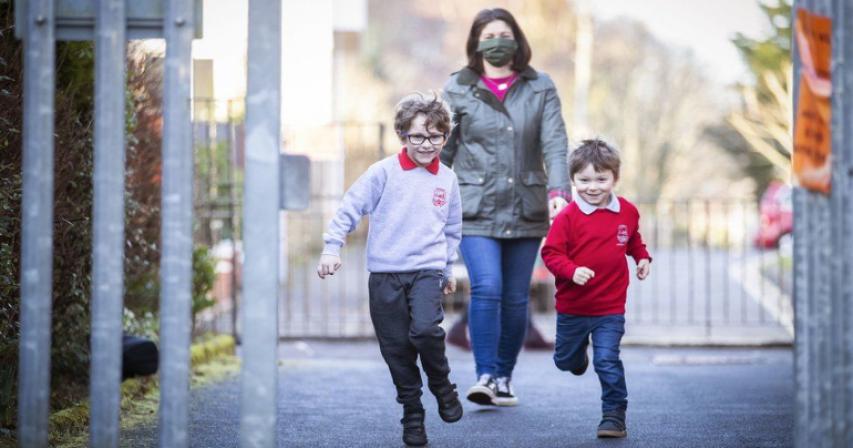Covid - Millions of pupils going back to school in England
- 3 years ago

Millions of children in England are going back to school after more than two months studying at home in the latest lockdown.
Many secondary schools will have a phased return during the week, allowing pupils to take Covid tests, and face masks will be worn in classrooms.
Most primary schools are expected to open for all pupils from Monday.
Prime Minister Boris Johnson described the return as an important first step towards a "sense of normality".
It marks the first step of the "roadmap" out of the national lockdown, which has been in place since the beginning of January.
The government is now considering various measures to help pupils in England catch up on lost learning, including longer school days and shorter holidays, according to Education Secretary Gavin Williamson.
So, how will school life be different for pupils returning to classrooms this week?
Testing but no exams
This fourth big return to school in England since the start of the pandemic will come with questions about catching up on missed lessons, young people's wellbeing and a replacement exam system.
Secondary school pupils will have regular Covid testing, with three tests in school before switching to being tested at home.
A survey from head teachers suggested 76% of secondary schools would have a phased return, with different year groups starting on different days, to allow time for testing.
"There will be a full return but it will be from - not on - Monday, 8 March," said Geoff Barton, leader of the ASCL head teachers' union - describing the testing sites in schools as looking like "field hospitals".
The Covid tests, with swabs of nose and throat, are voluntary - and there have been warnings from school leaders that getting parental consent has been the biggest difficulty.
Face masks are expected to be worn in secondary school classrooms, where social distancing is not possible, at least for the remaining weeks of this term.
The latest lockdown has seen the cancellation of A-level, GCSE and vocational exams, and pupils will return to study for a new system based on teachers' grades.
Jules White, head of Tanbridge House School in Horsham, West Sussex, said there would be a mix of "immense relief tied to a little apprehension" and meeting friends would be as important for pupils as getting back to learning.
In his school of 1,500 pupils, testing began last week and the phased return will stretch into next week.
Ryedale School in Nawton, North Yorkshire, tested all its pupils last week and all year groups will return to face-to-face teaching from Monday.
Parents supporting
Primary schools will be expected to fully reopen - and pupils will not have to take Covid tests or wear masks.
The challenge would be "supporting pupils socially and emotionally, not just academically", said Paul Whiteman of the National Association of Head Teachers.
UK chief medical adviser Prof Chris Whitty has said "everything is strongly in favour" of pupils returning to school - with extra safety measures in place, such as testing, the wider use of masks and an early "natural firebreak" of the Easter holidays.
A survey of 6,000 parents from the Institute for Fiscal Studies found widespread support for the return to school - with nine in 10 saying they would have sent their children back even if it had not been compulsory.
But two-thirds of parents were "concerned that their child has lost out on learning".
A joint letter from teachers' unions called for "flexibility" for schools over safety measures - and a check during the Easter holidays for any spikes in infections.
Schools have remained open for vulnerable and key workers' children and about a quarter of pupils have been attending primary schools.
Catch-up classes
But for many pupils, apart from one day in January before the lockdown, this will be the first week back in school this year.
The ambition is that this fourth return - following the short-lived attempt in January and returns last June and September - will be the last needed.
The government has appointed Sir Kevan Collins as an "education recovery commissioner", who will begin the process of helping pupils make up for the disruption and lost time in school.
Ofsted inspectors have warned that disadvantaged children are more likely to have been adversely affected - and the government has announced £1.7bn to support catch-up schemes, such as tutoring and summer clubs.
There have also been suggestions of changes to holidays and the school day.
Labour leader Sir Keir Starmer has called for schools to have "catch-up breakfast clubs".
There have been concerns about children's mental health during the pandemic - and a study by researchers at the universities of Essex, Surrey and Birmingham reports a "significant rise in emotional and behavioural difficulties".
• In Scotland, younger primary pupils went back last month - with more primary and secondary years returning from 15 March.
• In Wales, younger primary pupils went back last month, with further primary and secondary groups back between 15 March and mid-April.
• In Northern Ireland, younger primary pupils are returning on 8 March, with some secondary years starting 22 March.
England's Education Secretary Gavin Williamson said the return to school would be a "moment of joy" when students would get back to their teachers and friends.
"I do not underestimate how challenging the last few months have been with some children in class and most at home, but I do know how important it is for all children to be back in school, not only for their education but for their mental health and wellbeing," said Mr Williamson.
Source: BBC
Comments